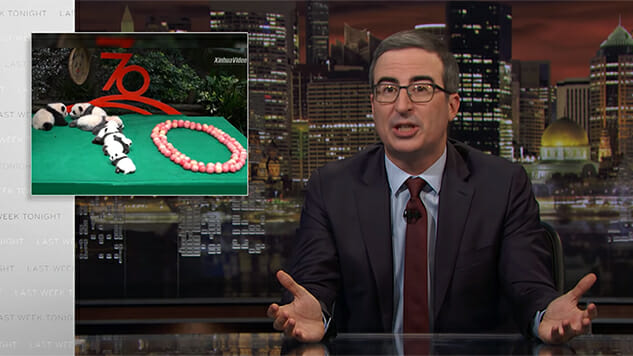John Oliver Discusses Old Policies, New Problems in China on Last Week Tonight
Image via HBO Comedy News Last Week Tonight
This past week, China celebrated 70 years of Communist rule. The event led to fanfare and a lot of formations of the number “70” with as many objects as people had on hand, which included a few pandas and more apples. Oliver takes this surface-level celebration as an opportunity to closely analyze communist China’s most radical and consequential policy, the one-child policy that began in 1980 and ended in 2015. Oliver breaks down how this rule came about and analyzes the aftereffects that are still taking shape today.
The policy itself is self-explanatory: Couples were limited to one child in a nationwide directive, but enforcement varied on the local level in severity. The government envisioned a China that would have a higher standard of living, as well as controlled population growth. The policy was crafted by military scientists, who, as Mei Fong, author of One Child states in a clip, “envisioned women like machines.”
Propaganda surrounding the already-hapless policy was just as illusory, including messages like “have fewer children but raise the quality.” “Children are not quality individuals,” Oliver jokes. Messages like these have a darker underlying meanings in line with the policy itself: that people and reproduction can be designed and planned out like a military operation.
This led to an array of consequences for the generation born as a result of the laws. Some are ridiculous but somewhat laughable: A child in a clip was named “20,000 Yuan” because that’s how much his family was fined to have him. Other detrimental effects are life-wrecking: One woman was forced to have an abortion at 9 months pregnant because her husband had a child in a previous marriage. “It’s like an arrow through my heart,” she said in a clip, fresh tears falling at an old but brutal wound.
At this point in the segment, the situation gets extremely serious and personal, and Oliver deftly handles it while covering the many perverse effects of this situation. All of the problems facing the one-child policy generation stem from one fact: that families favored male children, as they saw them as an economic investment in the families’ future. Under the constrains of the policy, families went to often barbaric measures to ensure their one child was a boy, which included abandoning girl babies, having sex-selective abortions or female infanticide.
The bitter irony is that China’s gender ratio is now vastly skewed, with about 34 million more males than females in the nation. This lost generation of women is now desperately sought after, too late. Oliver takes the latter part of the segment to delve into the repercussions of this generation-wide loneliness. The increase in competition to find a wife has proved lucrative for oddball companies aiming to train men to pick up women, but isolating for the men themselves (and undoubtedly agonizing for the women who have to endure their corny pick-up tactics).
No matter how many smooth lines or magic tricks these men learn, the blunt truth of the gender disparity means “millions of men who want a wife will never have one,” Oliver says. One of the ways these men fill this void is by purchasing from the growing market of sex dolls, but the other, far more sinister way is by buying real women. Kidnappings and human trafficking rates have increased dramatically in and around China as women and girls are sold to Chinese men as wives.
Even with all these severe ramifications still raging through China since the policy ended, the government still insists on policing reproduction. The one-child policy has now been upped to an allocated two children, and unsurprisingly, this is still causing issues. The government seems to think that chance at the model atomic family will smooth over the wrong done for the following generation, an assumption that will undoubtedly blow up in their faces in the years to come.
It’s bitter but foreseeable that those who suffer the most from this policy are Chinese women, both the ones forced to abort or give up their children, and the women and girls born despite the policy who are now suffering from or at the risk of human trafficking. Oliver finishes the segment with a brilliant analysis of the ironic circularity of the situation: China now has to manufacture “headless, silicone women, because rocket scientists nearly 40 years ago didn’t care what their policies would do to real ones.”
Watch the full segment below.